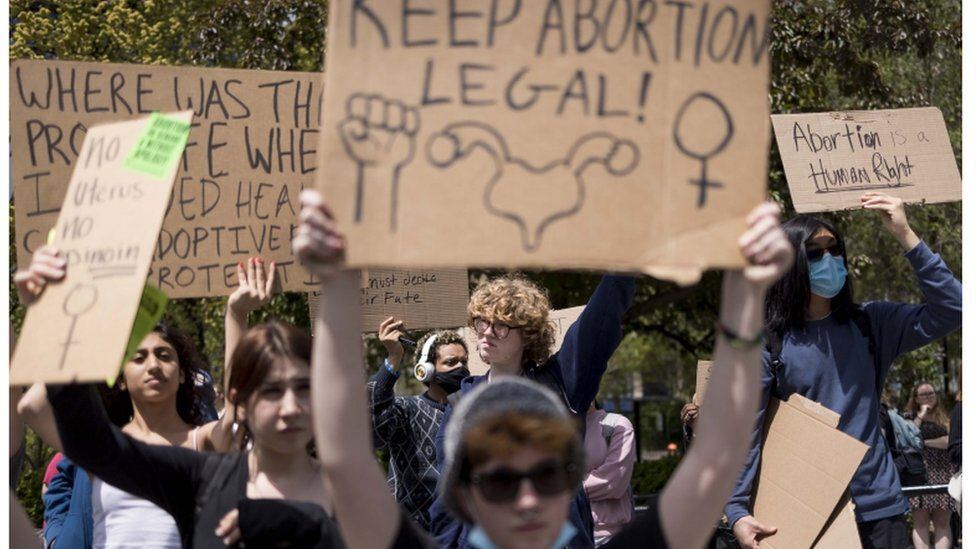The Holy Bible, the basis of most Western religions, barely addresses the subject of abortion. When he does, it is indirectly, which allows for a wide range of interpretations.
Religious people often cite two passages to justify the idea that a Voluntary termination of pregnancy it would be a sinful act and contrary to the will of God. Both appear in the Old Testament, that is, they refer to the period before the birth of Jesus.
LOOK: The last day of the last abortion clinic in Arkansas, USA, where one of the toughest laws in the country takes effect
At the beginning of the book prophet Jeremiahprobably written in the seventh century BC, the author presents the words that God would have said to him: “Before I formed you in the womb I knew you, and before you were born I sanctified you.”
In the psalms, the largest of the books that make up the Bible, there is another reference to this life that would exist even before the birth.
In song number 139, the author praises God and says: “Your eyes have seen my body still without form.” “And in your book all these things were written, which were then formed, when there was not yet one of them,” he continues.
For the experts consulted by the BBC, the discussion starts from philosophical and biological premises that are the keys to interpreting the sacred texts: when exactly would life begin?
“It is important to note that the Bible addresses the issue of abortion by emphasizing the value of human lifethe call by God even before it is inside the mother’s womb”, defends Father Renato Gonçalves da Silva, a theology teacher with an emphasis on sacred writing from the Pontifical Catholic University of São Paulo (PUC-SP) and currently a student of Biblical exegesis at the Pontifical Biblical Institute in Rome.
“The ‘before‘ underlines the biblical truth that human life comes from a timeless decision of God, who within his omnipotent and wise existence has already formed, known and sanctified human life”, defends Silva.
The scholar emphasizes that “the creation of a human life is a divine decision made once and for all and always updated, regardless of the circumstances of the human world”.
potential life
On the psalm, the historian, philosopher and theologian Gerson Leite de Moraes, professor at Mackenzie Presbyterian University, comments that “this passage is usually brought up to say that this ‘substance still without form’ is the early life processtherefore there would already be something there that would be a person”.
“The whole discussion is this: to be a person or not to be a personwhen life begins,” says Moraes.
“Opponents of abortion work with the idea that from the moment of fertilization you have a person there, created by God, although the whole process is organic. The soul would be given by God, therefore God is the owner of life. , the creator”.
The theologian explains that, according to this reasoning, God “knows the past, the present and the future and, therefore, attacking that formless substance that would already be a person constitutes a crime”.

Of course, this interpretation did not happen overnight and there are philosophical layers to support the religious understanding of these few lines.
Moraes points out that it is a logic “taken from the thought” of the Greek Aristotle (384 BC – 322 BC), in terms of the concepts of act and power. “The seed metaphor“, contextualizes the teacher.
“The seed has the potential to become a tree. It is the same idea that applies to a person. Even if at the time of fertilization there are no arms formed, eyes formed, a complete person, there is potential for it. So So if you leave that potency in its natural process, after nine months you officially have a person coming into the world.”
Moraes acknowledges that there are few biblical quotes and references that allow interpretations about abortion. And he explains that, within the religious mentality, the discussion ends up being guided by the question that God is understood as “the creator, the owner of life“.
“I would be aware of all the previous lives, even if they came into the world,” he says. “For a religious, attacking a fetus is attacking life.”
“Right to decide”
The Network of Catholics for the Right to Decide, a group that often diverges from the official position of the Church on issues related to sexual and reproductive rights, it emphasizes that the Bible cannot be used to guide the criminalization of abortion.
“Abortion is not a biblical issue. Biblical themes concern horizons of organization of society, of life, of the line of defense of life for all. And the life in abundanceas the Gospel says”, emphasizes sociologist María José Rosado, professor at PUC-SP and president of the organization.
“That means full life, which for men and women means control over own ability to do to other human beings and the ability to do what their sexuality and reproductive capacity allows human beings to do,” she adds.
“When the Bible is invoked to condemn abortionas fundamentalist, conservative and neoconservative religious groups generally do, it is done by reinterpreting passages in a way that makes it possible to sustain what they want to defend politically: the restriction of sexual and reproductive rights,” Rosado argues.
“Actually, there is no basis to invoke the Bible in favor of this restriction,” she says. “On the contrary, as feminist theologians show, the Bible should serve to expand the possibilities of fulfilling a full life.”
“The Bible says nothing directly about abortion. There is no categorical statement specifically about abortion. What we have are verses that point to the formation of the human being in the womb and how, from the mother’s womb, the human being is a being loved by God”, emphasizes hagiography scholar Thiago Maerki, a researcher at the Federal University of São Paulo (Unifesp) and associate of the Hagiography Society, in the United States.

What the churches do is an interpretation of certain verses, Maerki continues. “The Bible does not have a commandment that says ‘you will not abort’. We have the ‘thou shalt not kill’, which the religious often take to condemn abortion as well,” he says.
Many religious denominations use passages to “interpret”, according to him, that abortion is a crime.
“It’s not a statement, but a interpretation“, he says. “What often happens is an interpretation out of context, to justify their dogmas, their interests, their teachings,” he adds.
Evolution of Christian thought
The biologist and sociologist Francisco Borba Ribeiro Neto, coordinator of the PUC-SP Nucleus of Faith and Culture, considers that these new interpretations are the product of the evolution of knowledge.
“Catholic doctrine has always condemned abortion, understood as the act of killing a child still in the mother’s womb. However, the scientific understanding of conception and pregnancy It has changed a lot over the centuries. and the oldest texts did not always formulate a ban on abortion as currently proposed,” he explains.
“This has opened space for many authors to consider that abortion was somehow accepted by Christians in the Antiquity and the Middle Ages. This interpretation, which imagines the prohibition of abortion as something recent in the history of the Church, does not seem faithful to the historical development of ideas,” he says.
Ribeiro Neto points out that both motherhood and abortion “they are loaded with symbolic and affective meanings.”
“It is natural that there have always been people who, even declaring themselves Catholic, did not agree with the official teaching of the Church on such a sensitive issue. In today’s society, cultural plurality has allowed these disagreements to gain space in public debate “, clarifies the academic.

For him, however, “the most striking cultural phenomenon in relation to abortion was the rise of individualism and the absolutization of individual autonomy”.
“In the past, the hegemonic mentality considered that the child was a new human being, desired by God, and the mother did not have an absolute right over him.
“Currently, the hegemonic mentality establishes that the autonomy of the mother takes precedence over any other fact, so that the fetus’s right to life is determined by the will of the mother, or of both parents, at most”, analyzes Ribeiro Neto .
“This cultural change has had a direct impact on the interpretations of Catholic doctrine and explains the consolidation of groups that try to change the official teaching of the Catholic Church on the subject.”
For Father Renato Gonçalves da Silva “human life, even before the birth” has a “paradigmatic value in the Bible”, where it is presented as a gift “sanctified by God”.
Also part of the Old Testament, the book of the prophet Isaiah, probably from the 8th century BC, there is a passage that says: “Thus says the Lord who created you and formed you from the womb.”
For Silva, these passages illustrate how “all men” are created “in a very concrete way” in the “womb by God, the one who, in a primordial time, decided for the life of an entire people represented in the singular figure of each man that composes it”.
“For biblical Christianity, human life is already sacred in the womb because it is an extension of the life of the son of GodChrist Jesus who lives, in a paradigmatic way, in each one of the men in a unique way”, adds the religious.
Silva agrees that the subject, however, is treated in the Bible “implicitly.” According to him, there are two reasons for this.
First, because the sacred texts “they prefer to emphasize the sacredness of human life by trying to persuade their listeners to reject abortion through positive arguments.”
In addition, defends the priest, “for the mentality of the biblical man, abortion is a practice so explicitly condemnable that it does not deserve great speeches to define it as a great error”, an observation that does not reconcile with the fact that there is a commandment that says “Thou shalt not kill”.
What there are are records that show that the criminalization of abortion was part of the mentality of the early christians.
In the Didache, a 16-chapter text written in the first century of the Christian era that served as a kind of catechism, there is a passage that says: “You shall not kill, through abortion, the fruit of the breast.”
First-century Christianity already explicitly condemned the widespread practice of abortion between Greeks and Romans”, highlights Silva.
Source: Elcomercio
I, Ronald Payne, am a journalist and author who dedicated his life to telling the stories that need to be said. I have over 7 years of experience as a reporter and editor, covering everything from politics to business to crime.

:quality(75)/cloudfront-us-east-1.images.arcpublishing.com/elcomercio/GE3DCNBNGA3C2MRWKQYDAORRGY.jpg)

:quality(75)/cloudfront-us-east-1.images.arcpublishing.com/elcomercio/P2MGJI6HARF3ZGB6M3N4A3V5EQ.jpg)
:quality(75)/cloudfront-us-east-1.images.arcpublishing.com/elcomercio/S3I42UY6TZHOBEIFET5YHFLEBU.jpg)
:quality(75)/cloudfront-us-east-1.images.arcpublishing.com/elcomercio/HYV45V2F4FDZ7CFLYIN57ZVTSM.jpg)

